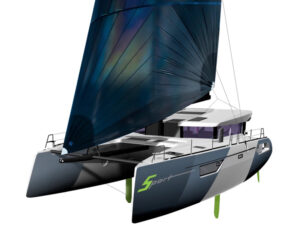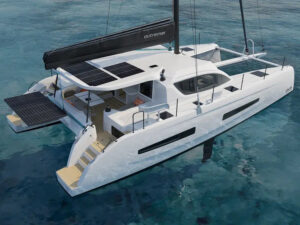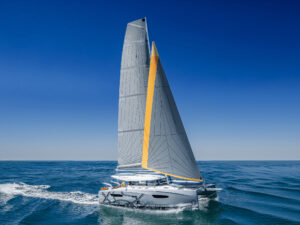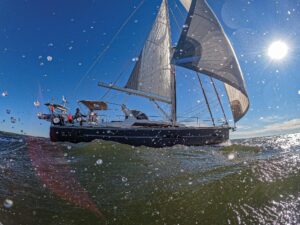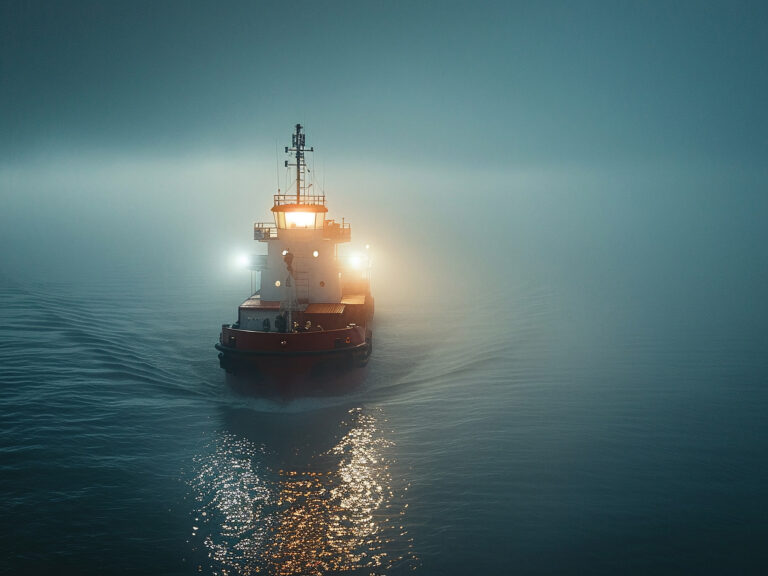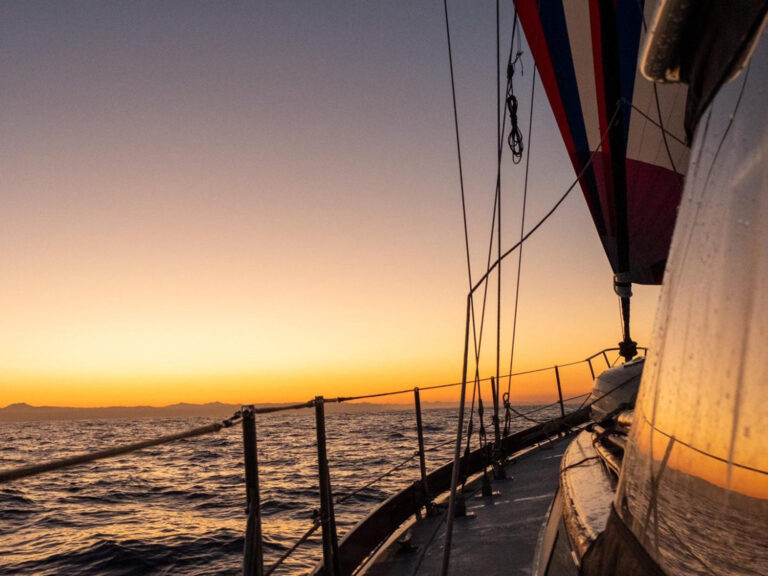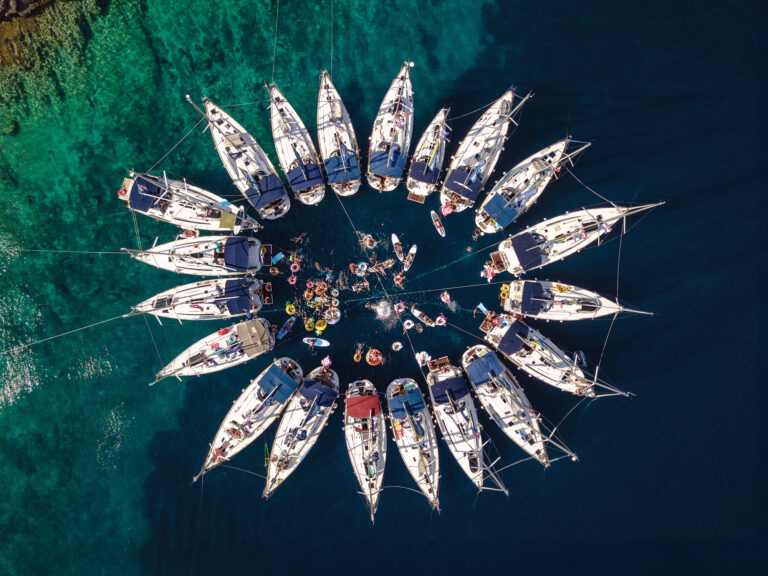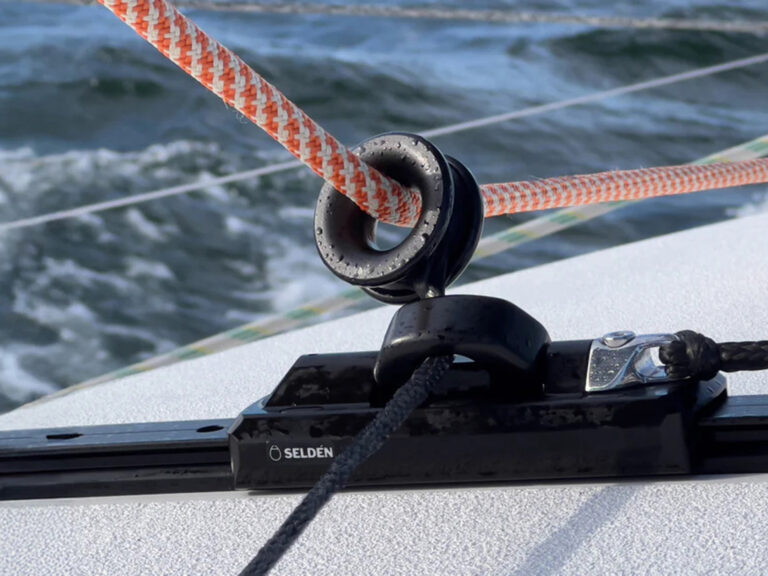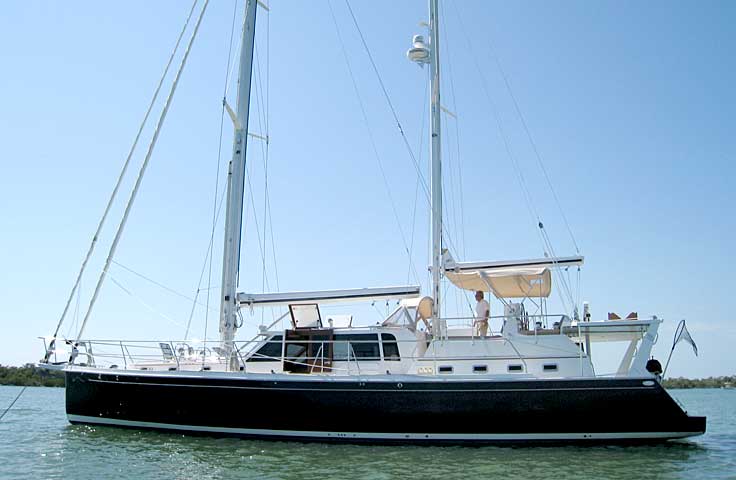
For 35 years now, Walter Schulz has been working every side of the yacht-design paradox, drawing what’s best from the nearly forgotten past and the up-to-the-minute present, then adding the occasional flash of original inspiration. Today-with nearly 400 boats launched that range from 28-footers to 53-footers, including 99 iterations of the iconic Shannon 38-it’s tempting to think of Schulz and company as creators of merely traditional cruising boats. But he’ll be the first to tell you about all the guff he’s taken for innovations that he’s brought to boat shows throughout his career: for the lazy jacks in 1978, for the bow thruster he himself built for a 50-footer in 1981.
“Each time,” he said, “I get everybody busting my chops. ‘What are you doing! Another heresy!'”
In the Shannon 53 High Powered Sailer, Schulz has delivered his grandest heresy yet: a luxury 53-foot, twin-headsail yacht that draws a mere 4 feet 9 inches, sails at 9 to 10 knots comfortably, motors fast and efficiently, provides cozy inside steering, and in its “sketch” configuration-another Schulz original, blending twin headsails with a ketch rig-passes under the bridges of the Intracoastal Waterway. The boat is also available in a taller single-mast/twin-headsail configuration that Schulz calls a “scutter.”
I sailed hull number one on Rhode Island’s Mount Hope Bay with Schulz himself last December. We motored under Tiverton’s 65-foot bridge, rolled out 1,200 square feet of sail, and hardened up into 15 to 18 knots of breeze. After a bit of tweaking and trimming, the 51,000-pound yacht settled in at a stable 7 or 8 degrees of heel and a steady 9 knots of boat speed, hitting the mid-9s in the puffs.
The hull form of the 53 HPS starts with a fine entry forward and flares in the waist to wide, flattish sections that, among other things, confer considerable form stability under sail and plenty of interior space. The waterline is nearly as long (98 percent) as the overall boat. Twin semi-balanced rudders that are relatively short and installed well outboard of the centerline provide sure steering under sail without compromising the boat’s shoal-draft aspirations. Twin engines are canted outboard for better motorsailing performance.
Like other Shannons, the hull is a single-part lamination of stitched biaxial fiberglass cloth and vinylester resin in the outer skins for osmosis protection, then polyester resin throughout. The hull’s core is linear Corecell foam set in Core-Bond, a two-part polyester-based adhesive. The deck is cored with cross-linked foam. The keel is cast lead encapsulated in the hull.
Schulz is a hands-on yard owner who actively sails his boats at least 1,000 miles every year. The yard’s 50 employees build about eight boats a year, every one of them unique, and with minimal work subcontracted out. To a new observer, Shannon’s fine joinery work immediately bespeaks quality. But behind it are areas that deserve equal attention: plumbing, wiring, and machinery that’s elegantly installed and labeled. What you’ll see is a kind of quality that promises not only to wow at the boat show but also to provide lasting value many years out.
In these ways, the HPS is like other Shannons. In fundamental design and intent, though, it’s altogether different. What may initially seem most heretical about this boat is its looks. “HPS” stands for High Powered Sailer, but the boat’s lines above the waterline, especially aft, comprise the squarish forms of some trawlers or cabin cruisers. Sailors steeped in prototypical cruising-boat aesthetics, the kind exemplified by the Shannon 38, may be taken aback by their first impression of the 53 HPS. But a sailor whose tastes are steered more by the function in the form will love a second look.
Most intriguing are the several spaces this boat offers for both halves of a cruising life: the getting there and the being there. The layout of the cockpit’s work stations and the deck is refined. Twin helm stations on deck promise good sight lines whether you’re under sail or coming in to the dock. All running rigging is led intelligently to power winches right where you want to reach for them. At the inside steering station, visibility through the windows is at eye level for 270 degrees. One of this boat’s many fine details is a fixed hatch in the cabin top above the inside steering station that provides great visibility of the masthead and sails while you’re under way-a bugaboo of even traditional cruising cockpits with large biminis.
Now consider the being-there side of the equation. In the main saloon, you’re perfectly sheltered while enjoying the view outside. In the cockpit, you’re in as much sun and wind as you want to be. In the aft cabin, you’re looking not through 6-inch portholes but through full-height sliding doors at the best coastal real estate in the world. The outside deck aft of the owner’s saloon and one level below the cockpit is a partly sheltered outdoor terrace.
“What I was initially looking for,” said the owner of the boat I sailed, “was a boat that had to sail reasonably well, but I knew there had to be a compromise.” Indeed, given his wish list-shoal draft, bridge-friendly rig, raised-deck saloon, every comfort of home-we’d think so, too.
But having sailed the boat for several months, he said: “I’m not so sure that compromise is there now.”
Tim Murphy is a Cruising World editor at large and Boat of the Year judge.
Specs
LOA 53′ 7″ (16.33 m.)
LWL 52′ 7″ (16.03 m.)
Beam 17′ 6″ (5.33 m.)
Draft 4′ 9″ (1.45 m.)
Sail Area (sketch/ 1,200/1,368 sq. ft.
scutter) (111/127 sq. m.)
Ballast 12,000 lb. (5,443 kg.)
Displacement 51,000 lb. (23,133 kg.)
Ballast/D .24
D/L 157
SA/D (sketch/ 13.93
scutter) 15.88
Water 180 gal. (681 l.)
Fuel 480 gal. (1,817 l.)
Holding 80 gal. (302 l.)
Mast Height (sketch/ 64′ 0″/76′ 0″
scutter) (19.51/23.16 m.)
Engine Two 110-hp. Yanmars
Designer Schulz, Carter & Associates
Price $1,587,500
Schulz Boat Company
(401) 253-2441
www.shannonyachts.com

